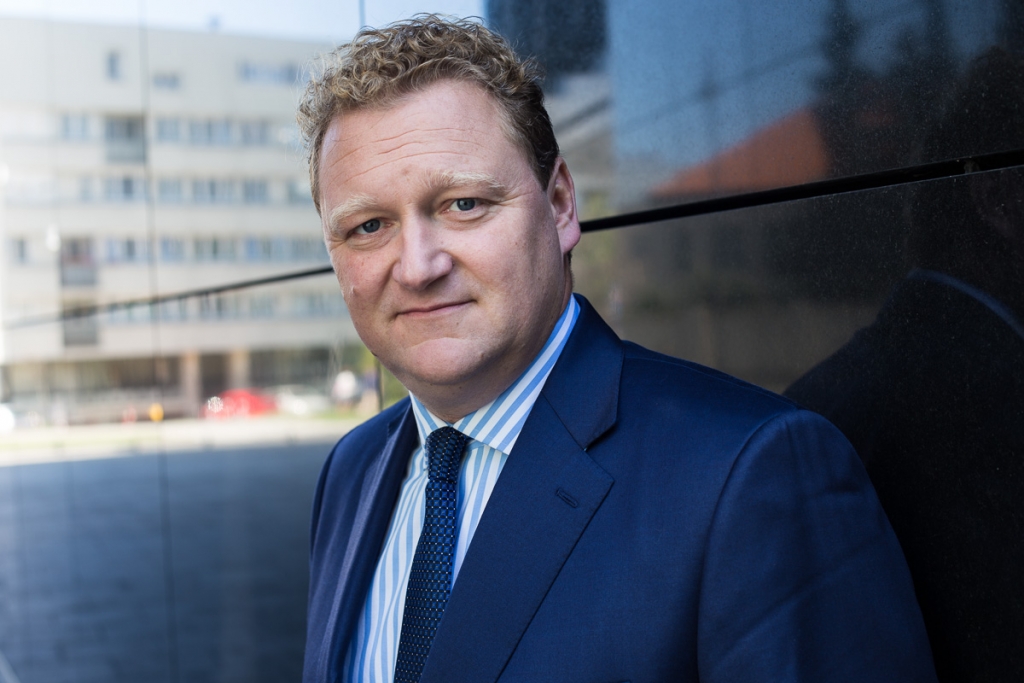“You need to look at liquidity, the growth potential of the economies. I would be investing in all of the CEE countries rather than the UK or Germany or France, for obvious reasons. CEE is the future of Europe,” says a bullish Hadley Dean.
With over 20 years of experience in real estate, Mr Dean, former CEO of EMEA Compass Offices and Colliers, now CEO of EPP, is well positioned to recognise real opportunities.
“The retail investment market has been very strong across CEE,” he tells Emerging Europe. “It’s worth just under 50 per cent of the total market volume of all investment deals. The big markets are, of course, Poland and the Czech Republic, while a bit of Hungary and Romania is growing too.” According to Mr Dean, the markets in the Baltics and Balkans are smaller, and as such do not attract a lot of big institutional money.
In regards to retail real estate, the region’s markets have developed differently. Poland is a special case, not least in Warsaw, where the concept of high street shopping does not really exist, and the majority of shopping is done in malls. Conversely, in Prague, Budapest and Bucharest as well as other major cities, high street shopping does exist and is progressing quite well.
Long haul
“We are a long-term retail landlord,” he says. “I am often asked why we as EPP do not invest in other markets. There are really two reasons. First, retailers do not see this region as one market. For the time being, retailers have dedicated teams in each country, and the reason for this is that 60 per cent of retail is local. You have to tailor your product to the local market.”
This, believed Mr Dean, is why many western retail chains/brands fail. Instead of adapting their offerings to consumers of local markets, they just go in expecting things to progress as they did in their home markets. As he explains, the fact that retailers do not always tailor their offerings to local consumer needs means that they end up losing sales or having to leave the market. This trend has been seen in Poland in recent years with the likes of Marks & Spencer (M&S), as well as GAP, to name but two.
“What they were doing is strange. M&S works in the Czech Republic, really well, the Czechs love M&S. Whereas in Poland, they did not tailor their products to cater for local consumers.” Mr Dean explains.
“I have been in this region for the last 20 years, and in the last recession the companies which had the biggest problems are those that had five different management teams, five different tax laws, five different legal systems and sets of politicians. I’m not saying that we won’t look at the region as one, but we will wait until retailers see it as one,” adds Mr Dean, “we want to go to where the biggest opportunities are, and you don’t see the same growth projections in the Czech Republic, as you do in Poland.”

Click and collect
Whilst many see e-commerce as the future of the retail industry, Mr Dean believes that this may not be the case for all markets in the region. Granted, it is inevitable that e-commerce will grow, however there are other strategies that have helped keep brick and mortar stores in business.
“E-commerce has killed the high street in the UK. Shopping centres started it, but e-commerce has finished it off. But in terms of the region, each market is different. The UK has 18 per cent e-commerce penetration, Spain has 5 per cent and Italy has 4 per cent. I would say the biggest impact e-commerce will have in the region would be in the Czech Republic, where people are much more tech savvy. Romania meanwhile has more of a Latin culture, it’s all about going out with the family.
“In Hungary, the big shopping centres are doing very well, dominating their catchment areas. It is the secondary and tertiary shopping centres that are struggling.”
In Poland, click and collect shopping is extremely popular, accounting for 50 per cent of all online sales.
“In Poland what consumers do is choose the products online, place the order to collect in store, then go after work or at the weekends to look at the products, try them on, feel them and only then will the consumer will pay for the items that they choose to keep,” says Mr Dean.
He feels that there are three reasons why click and collect is so powerful in Poland.
“Firstly, the average Pole works more than the average German. Secondly, the average purchase price of an online product is half of what it is in Germany, but the average delivery price is 85 per cent of that in Germany. Finally, Poles are very conservative, particularly when it comes to money, and there is a large percentage of the population that do not like giving financial or private data to someone over the internet that they do not know,” explains Mr Dean.
Strength in numbers
In order to be successful in any of CEE market, Mr Dean believes that investing in retail real estate is about creating strength in numbers.
“If you own one shopping centre, retailers will take you to the cleaners as you have no leverage. However, if you own as many shopping centres as we do, you can have more of a peer to peer conversation with them”
At present, EPP owns 19 shopping centres, have recently committed to buying another 10 and are due to open a new shopping centre in Młociny, Warsaw, next year.
“In Warsaw, we only have the one project, Młociny, at the moment. However, we are working with the city council on a new project, which is unlike any shopping centre in Poland. Nobody wants food courts in shopping centres anymore, what they want are food halls like Hala Koszyki. Therefore in Młociny there will be about 50 different restaurants/bars and cafes, as well as something similar to the food courts of old too.”
The transition to offering more dining spots and eateries is also to combat the Sunday trading ban that came into force in Poland in January 2018.
“People don’t have anywhere to go on Sundays anymore,” explains Mr Dean. “So what people want is a nice, bright, safe place, where they can have a meal with their families, where there are attractions for children like cinemas or trampoline parks as well as outdoor gardens. This is basically what our future projects and developments are about.”
Many of EPP’s predictions with regards to the Sunday trading ban have been correct.
“In Hungary we saw a dip in footfall, and within four to six months that footfall came back. People have adjusted their shopping habits, that is happening in Poland too. We have seen an increase of 16 per cent on Fridays, 24 per cent on Saturdays and surprisingly one thing we did not predict is more people going shopping on a Monday,” adds Mr Dean.
The future
In conclusion, Mr Dean is adamant that the CEE region is the future of Europe.
“As and when the next crisis hits, it will be exactly the same as before. All western European countries will need to cut costs, become more efficient and will outsource their middle management jobs to this region. Countries like Poland and the Czech Republic who have a low GDP to debt ratio will just unscrew the taps, spend a bit more on infrastructure and will ride through the next recession. If you are going to be investing anywhere you need to invest where there is growth. The problem is that liquidity is where investors got caught out last time. If banks are not lending you are in hot water.”





Add Comment